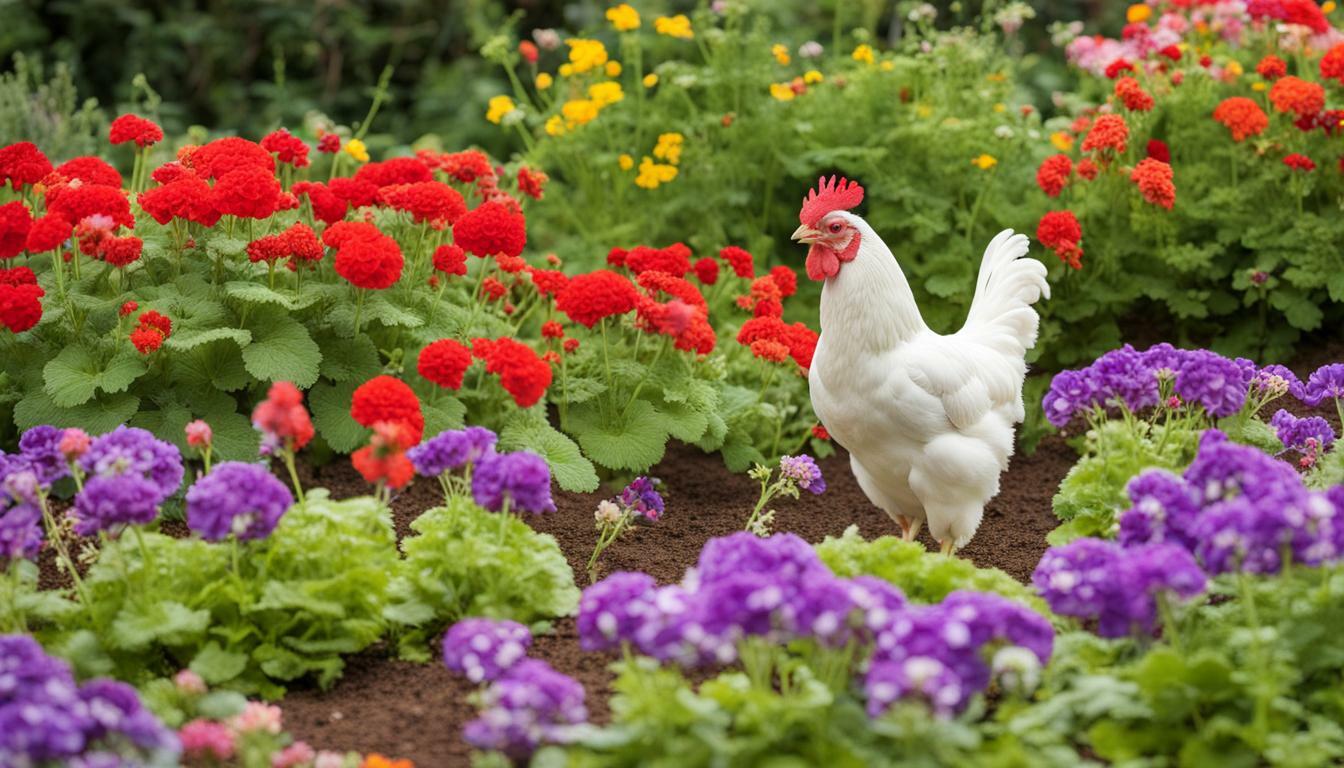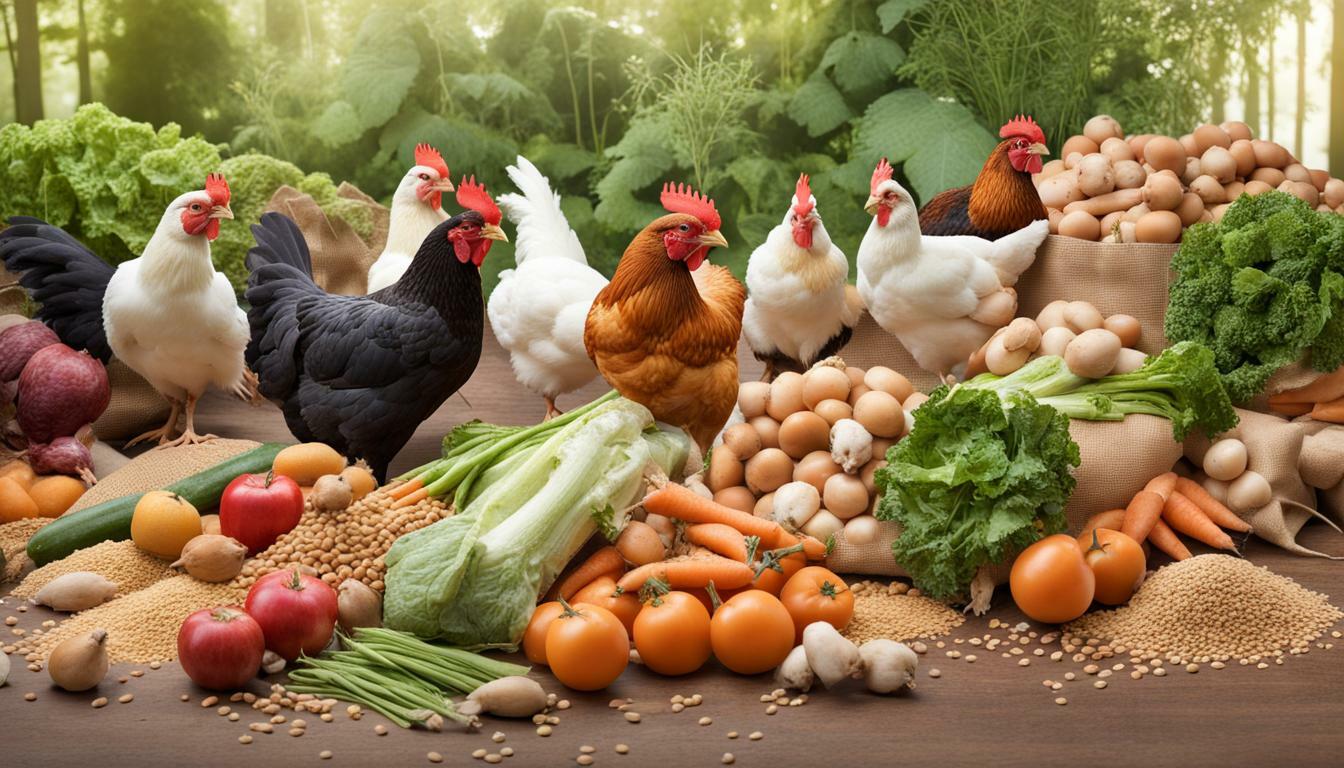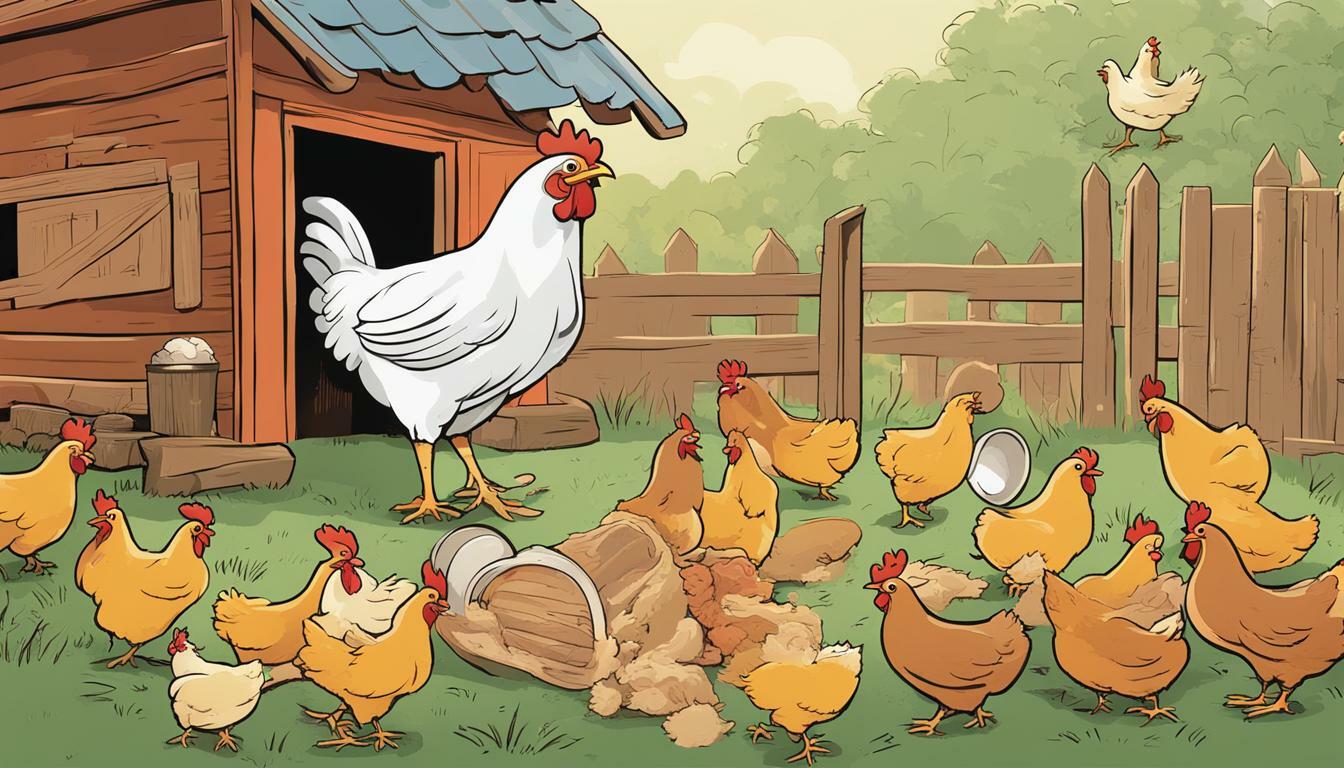Can Chickens Eat Geraniums? Fact or Fiction for Backyard Farmers

Table of content:
- Are Geraniums Toxic to Chickens?
- What Plants are Poisonous to Chickens?
- What Flowers Can Chickens Eat?
- What Vegetables Can Chickens Eat?
- What Fruits Can Chickens Eat?
- What Foods are Bad for Chickens?
- What Plants Should be Avoided Around Chickens?
- Are Geranium Leaves and Flowers Safe for Chickens?
- Can Pet Chickens Eat Houseplants?
- Final Thoughts
Chickens are curious, fun-loving birds that bring joy to backyard flocks. However, their tendency to peck and taste-test new things can get them into trouble. Many common garden and house plants can be toxic or even deadly to chickens if ingested. So an important question for any chicken keeper is: can chickens eat geraniums safely?
Are Geraniums Toxic to Chickens?
Geraniums, also known as pelargoniums, are a popular flower and garden plant. The scented varieties are also common houseplants. While geraniums are not known to be highly poisonous to chickens, they do contain certain compounds that can cause health problems if eaten.
The main concerns with chickens eating geraniums are the plant’s astringent compounds and essential oils. These substances can potentially cause minor gastrointestinal upset or act as diuretics/laxatives if consumed in significant quantities.
So while a few curious pecks at your geraniums likely won’t harm a chicken, it’s best not to allow them to eat large amounts. The flowers, leaves, and stems of geraniums contain the highest levels of these problematic compounds.
What Plants are Poisonous to Chickens?
While geraniums themselves are not severely toxic, many common plants can be very dangerous or even deadly to chickens if ingested. Some examples of poisonous plants to avoid around backyard chickens include:
- Foxgloves – All parts of foxgloves contain digitalis glycosides that affect the heart.
- Lilies – Daylilies, Asiatic lilies and other varieties contain toxins that cause kidney damage.
- Rhododendrons & Azaleas – These flowering shrubs contain grayanotoxins that affect nerves/heart.
- Daffodils – The bulbs contain toxic alkaloids that cause vomiting, diarrhea.
- Tulips – All parts contain toxic lactones that can be dangerous if eaten.
- Potato Plants – Leaves/stems contain solanine, berries are also toxic.
- Rhubarb Leaves – Contain oxalates that cause kidney problems.
It’s important to identify and remove any known poisonous plants from areas accessible to your flock. Also familiarize yourself with common poisoning symptoms like vomiting, diarrhea, seizures, respiratory issues, and lethargy. Quickly isolate and call your vet if poisoning is suspected.
What Flowers Can Chickens Eat?
While certain flowers are toxic, many common garden flowers are safe and nutritious for chickens to eat in moderation. Some edible flowers they enjoy include:
- Nasturtiums – Entire flowers and leaves are edible. Provide vitamins A, C, iron.
- Pansies & Violas – Petals add color and vitamins to their diet.
- Roses – Both the petals and rose hips are nutritious.
- Sunflowers – Petals, leaves and seeds are all chicken-safe.
- Marigolds – Petals contain lutein which is great for egg yolk color.
- Dandelions – Flowers, leaves and roots provide many nutrients.
- Carnations – Petals are a tasty treat, but avoid forced/dyed flowers.
When feeding flowers, introduce new ones slowly to watch for any signs of sensitivity. Rotate a variety of edible petals into their diet for best nutrition. Most are high in valuable vitamins, minerals and antioxidants.
What Vegetables Can Chickens Eat?
Chickens should eat a balanced diet including quality poultry feed, treats, and fresh fruits/vegetables. Many common garden veggies provide important vitamins, minerals and nutrients chickens need. Some great options include:
- Leafy Greens – Romaine, kale, chard, cabbage provide vitamins A, C, K.
- Root Crops – Potatoes, sweet potatoes, carrots, beets, radish.
- Squash – Zucchini, pumpkin, yellow squash provide vitamin A.
- Corn – Kernels are a favorite treat, cobs can be pecked for enrichment.
- Peas & Beans – Great source of protein. Can grow directly in chicken runs.
- Broccoli & Cauliflower – More nutritious than cabbage, good source of vitamin C.
Feed a variety of chopped veggies to provide a spectrum of vitamins and minerals. Offer vegetable scraps to reduce food waste. Just avoid raw potatoes or rhubarb leaves which are poisonous. Introduce new veggies slowly and monitor health for any issues.
What Fruits Can Chickens Eat?
In addition to vegetables, backyard chickens enjoy many fruits as nutritious treats. Fruits offer beneficial vitamins, antioxidants, fiber and natural sugars. Some chicken-safe fruits include:
- Melons – Cantaloupe, watermelon (no rinds). High in vitamin C.
- Berries – Strawberries, raspberries, blueberries. Packed with antioxidants.
- Apple – A favorite treat. Can be chopped or hung whole as a pecking toy.
- Bananas – Provides vitamin B6, potassium. Mash over feed for easy eating.
- Grapes & Raisins – Contain healthy sugars and vitamin K.
- Citrus – Oranges, grapefruit, clementines (no rinds). High in vitamin C.
- Pears & Peaches – Juicy fruits chickens relish. Monitor for choking hazards.
Moderation is key, as too much fruit can cause loose droppings. Ideally fruit should be under 10% of their total diet. Wash thoroughly and chop large fruits. Avoid poisonous fruits like cherries. Offer a rotating variety for overall nutrition.
What Foods are Bad for Chickens?
While chickens enjoy diverse treats and table scraps, some human foods are unsafe or unhealthy for chickens. Foods to avoid giving backyard chickens include:
- Chocolate – Contains toxic theobromine. Can cause heart problems and death.
- Caffeine – Found in coffee, tea, soda. Can cause tremors, heart issues.
- Alcohol – Fermented foods may cause neurological symptoms.
- Salty Foods – Excess sodium is hard on chickens’ kidneys.
- spoiled or Moldy Foods – Can cause illness if eaten.
- Raw Green Potato Skins – Contain solanine which is toxic.
- Uncooked Dried Beans – Contain hemagglutinin which is toxic.
- Avocado Skins & Pits – Contain persin toxin. Flesh is safe.
- Dry Beans – Raw beans contain hemaglutinin. Must be cooked thoroughly.
It’s also smart to limit “people food” to occasional small treats. Too much can lead to obesity, nutritional deficiencies or egg laying issues if calcium/protein needs aren’t met. Follow a proper chicken feed diet with healthy supplementation.
What Plants Should be Avoided Around Chickens?
In addition to removing any known poisonous plants, it’s wise to avoid certain species around chickens due to other concerns:
- Thorny Plants – Roses, bougainvillea, pyracantha. Can cause skin/eye injuries.
- Poison Ivy, Oak & Sumac – Cause painful rashes if chickens contact sap.
- Hallucinogenic Plants – Jimsonweed, weed, nightshade. Eating may cause neurological issues.
Plants that are irritating if touched or that have toxic berries or seeds should also be avoided in areas chickens will access. Fence off landscape beds that contain any questionable or delicate plants to keep your flock safe.
Are Geranium Leaves and Flowers Safe for Chickens?
While geraniums are not highly toxic, it’s best to fence off any prized plants and limit access. The highest amounts of potentially problematic astringent compounds and essential oils are found concentrated in the geranium’s:
- Flowers – Bright pink/red blooms should not be eaten in quantity.
- Leaves – Can cause minor GI upset or diuretic effect if widely consumed.
- Stems – Contain lower levels of the irritant compounds.
A few curious pecks likely won’t harm them, but large amounts may cause loose droppings or dehydration. Try hanging safer greens like lettuce heads or kale bundles to distract nibblers. Monitor for symptoms and consider moving pots to avoid overindulgence.
Can Pet Chickens Eat Houseplants?
Some chicken owners allow their pets limited indoor time. So an important question is whether houseplants are safe, should access be limited, or off-limits?
Many common houseplants are non-toxic and chicken-safe. But others contain compounds problematic if eaten. Some key guidelines on indoor plants are:
- Research toxicity before allowing access.
- Limit access to non-toxic plants only.
- Secure or remove high-risk toxic plants.
- Hang safer greens as alternatives to peck.
- Monitor for nibbling and remove plants if needed.
- Never allow access to poisonous plants.
Safe examples include spider plants, pothos, parlor palms, peperomia, mosses and many ferns. Toxic houseplants to avoid include sago palms, snake plants, azaleas, lilies, dieffenbachia and more. When in doubt, restrict plant access to be safe.
Final Thoughts
Geraniums themselves are not highly toxic, but can cause diarrhea or other digestive issues if chickens eat significant quantities. While small taste tests are unlikely to harm your flock, it’s recommend restricting access to your prized plants. Offer safer leafy greens, vegetables and fruits to satisfy their nibbling instincts instead. Always research and remove any potentially poisonous plants from their environment. With some smart precautions, you can safely allow your chickens to live up to their curious, pecking nature.
Welcome. I’m Adreena Shanum, the proud owner of this website, and I am incredibly passionate about animals, especially poultry. I founded adreenapets.com as a labor of love, stemming from my desire to share my knowledge and experiences with poultry enthusiasts worldwide.




